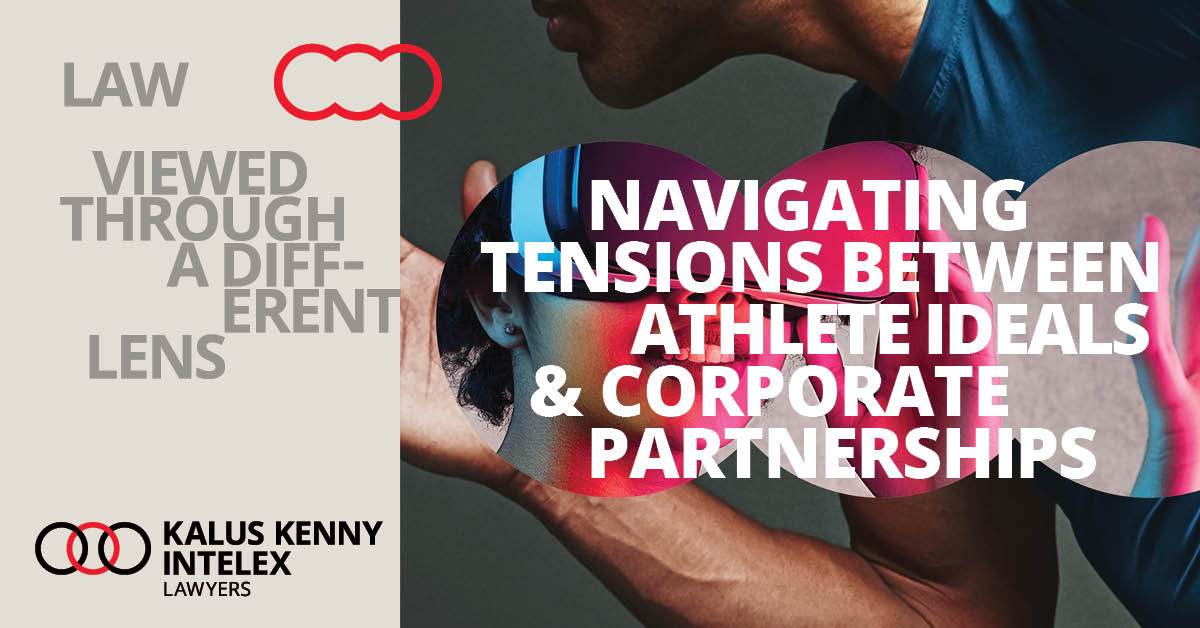It has been a big few weeks in Australian sport.
Tensions have sparked surrounding the competing interests of athletes’ ideals and brand identity, with that of corporate partnerships. This has raised discussions around athlete activism, and the balancing of individual athlete values and team sponsorship arrangements.
Athlete activism itself is nothing new. It has a long history in sport globally, which can be seen in moments of Olympic history with the Black Power salute in 1968, to the recent knee-taking of American football players and Formula 1 drivers. Historically, athletes may not have spoken out on certain issues due to potential backlash from within their club or from the public. However, successful activism of some athletes has empowered the increasing comfort for others to use their name and brand to make a difference for a cause they believe in, whether that be political, social or economic.
The Australian sports industry landscape is no stranger to change, whether that be from the effects of the Covid-19 pandemic or changing social values. However, the recent discussions around athlete activism have highlighted the importance of developing a synchronized sponsorship agreement, that is, one that aligns with the evolving social values of the team, corporate partners and players.
Background
In late October Gina Reinhart’s company Hancock Prospecting pulled out of a sponsorship deal with Netball Australia, which was set to see the governing body receive $15 million from the mining company over the next 4 years.
The decision came in the wake of reports that the Australian Diamonds player group had raised concerns about the sponsor after their Indigenous teammate, Donnell Wallam, had been refused an exemption from wearing the Hancock Prospecting logo on her player uniform. Reportedly, Wallam requested the exemption due to racist remarks made by the late founder of Hancock Prospecting, Lang Hancock.
A week later the Victorian Government announced they will take over the $15 million sponsorship deal under their Visit Victoria tourism program, which will include players and coaches being involved in campaigns to promote Victoria as a tourism destination and the 2023 Super Netball grand final being played in Victoria.
Issue
This is not the first time where athletes’ values have come at odds with partnership agreements in Australian sport. Recently, Australian Cricket Captain, Pat Cummins, announced that he would not be featuring in any advertising for Alinta Energy (a principal partner of the Australian men’s cricket team) during the final year of Alinta Energy’s sponsorship deal. Reportedly, this was due to concerns Cummins has about partnering with non-sustainable brands.
As these controversies continue to emerge in the industry, it is becoming clearer that athlete activism is a commercial reality going forward, which corporate partners must take into account when drafting agreements.
In light of this, sports organisations across Australia will no doubt be asking themselves ‘how can we reconcile the social expectations of athletes regarding their teams’ partnerships with the necessity of financial backing, and the lucrative sponsorship opportunities that present themselves?’ This question exposes the severe risks both athletes, teams and corporate sponsors face from this issue. Whereby, there is a risk of losing high profile players, as well as the risk of losing vital sponsorship funding.
This is a complex question. The relevant dichotomy is by no means an easy one to navigate. However, if both athletes, teams, and corporate sponsors can implement proactive and practical legal measures, these risks can be minimized.
Strategies for teams and corporate partners
Ensuring that you undergo suitable due diligence should be the priority for both teams and corporate partners.
Sports sponsorships, while they can be a great source of revenue for teams, and of exposure for brands, do (as we have recently seen) carry with them a degree of risk. The consequences of a partnership gone wrong can be great, so teams and corporate sponsors alike need to ensure that they are undertaking an appropriate level of due diligence prior to signing on. For corporate sponsors, this means looking into the history of the team and its players. For teams, this means looking into the history and social standing of the corporate sponsor. For both, it means asking, at the outset, whether a particular partnership ‘makes sense’.
Players contracts should include clear constraints, which can be used as a vehicle to deal with these types of issues before they come to light.
The athlete’s rights to refuse to promote a brand should be clearly stated, and the contract should comprehensively set out the process and parameters through which players can resolve these issues in collaboration with the team and its management. The circumstances under which a player can be exempt from wearing the team’s sponsor can be very clearly stated in a player’s contract. In return, team sponsorship agreements should then acknowledge that there may be circumstances where players may be exempt.
Teams and corporate partners must strive to take a co-operative approach.
In our experience, a co-operative approach can minimise costs associated with these kinds of disputes, including reputational costs, and, arguably most significantly, can assist with maintaining important commercial relationships and a positive public image. At the end of the day, it is in the best interests of all parties that these issues are resolved as quickly and as quietly as is possible.
Strategies for players
Athletes’ rights emerge from the players contract that they are signed to. This means it is integral for players to have an in-depth understanding of any contractual constraints and rights to refuse the promotion of brands.
If you are entering into a new contract, be sure that there are clear circumstances set out in the parameters of the contract that will allow you to exercise such rights. If you envision a circumstance that is not included in the contract, communicate this with the team. This will allow you to pre-empt future issues and create dialogue to voice your values with your team.
Conclusion
Teams and corporate partners should be aware that athlete activism is a commercial reality in today’s world. Therefore, proactive steps should be taken when drafting any contracts to address and prevent future issues. This will help to minimize costs and negative publicity that could emerge.
You may be asking yourself ‘what if I already have a contract in place?’ If that is the case, it is recommended that all parties be willing to renegotiate and work together collaboratively. From a commercial perspective, this will promote the preservation of relationships and navigate negative media attention that may come from disagreements.
Balancing individual athlete’s values and team sponsorship arrangements can be difficult. However, it is important that you understand all of your rights and obligations under the contracts you have entered, and any procedures that deal with these types of issues. If you are unsure on how your contracts operates or require assistance navigating tensions between athletes and corporate partnerships, you should seek legal advice.





